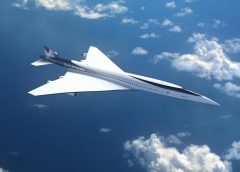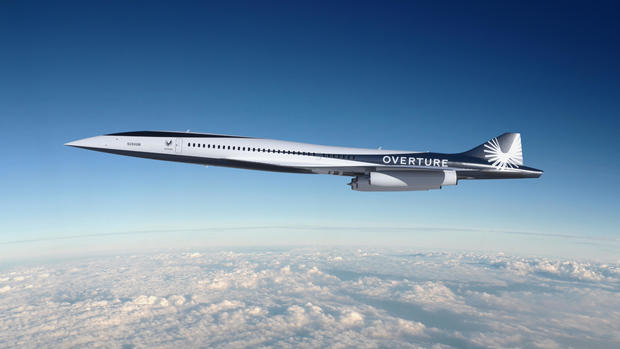
American Airlines places big bet on supersonic travel
[ad_1]
American Airlines has put down a nonrefundable deposit for 20 supersonic passenger jets that are still being designed and years away from flying.
It’s unclear how long it will take for the planes to be built, let alone ready to take off with commercial passengers aboard, as the aircrafts — made by Boom Supersonic — do not yet have an engine maker. Boom said it expects the airplanes to be operational by 2029, which would mark the first time a private company has made a supersonic aircraft.
Experts suggest the timeline could be even longer, given that the plane American has agreed to purchase only exists in computer-generated renderings and noting the long process for winning federal clearance.
But other competitors are also planning supersonic passenger jets. Spike Aerospace is developing an ultra-fast business jet, and startup Hermeus is developing a plane that would travel five times the speed of sound.
“I would describe it as possible — I wouldn’t describe it as likely that these planes will fly by then,” Craig Jenks, president of Airline/Aircraft Projects, an airline industry consultancy, told CBS MoneyWatch. “Everything about it is completely new. If you consider how long it takes to make airplanes that are much less novel, then it would be logical to say that it would be later [than 2029].”
Boom
The amount of American’s deposit was not disclosed. The novel aircraft, called the Overture, carries a list price of $200 million, but manufacturers typically give airlines deep discounts.
The agreement puts American, the largest U.S. airline, in a position to have the world’s largest fleet of supersonic jets. The deal includes an option for the carrier to purchase an additional 40 aircraft, which would carry 65 to 80 passengers, Boom Supersonic said in an announcement Tuesday.
American believes supersonic travel will play a key role for airlines.
“Looking to the future, supersonic travel will be an important part of our ability to deliver for our customers,” Derek Kerr, chief financial officer at American, said in a statement. “We are excited about how Boom will shape the future of travel both for our company and our customers.”
Last year, United Airlines agreed to purchase 15 of the same planes.
“A lot of people got burned the first time”
It has been nearly 20 years since the last supersonic passenger flight by the Concorde, the British-French plane that failed to catch on because of stratospheric costs and safety concerns.
“The idea that you could bring back supersonic is an exciting idea, but a heck of a lot of people got burned the first time around, especially with the cost,” Jenks said. “It’s got this fantastic cost-inefficiency once you break through the sound barrier that you have to compensate for by having sufficiently high fares.”
Jenks noted that American’s investment suggests the company is bullish about business travel rebounding from pandemic lows.
“It’s interesting that this order is being placed around the same time as everyone worrying about the return of business travel,” he said. “This goes against the whole idea that people aren’t going to fly for business in the same way, or at the same volume. This is a statement that says there is always going to be demand for premium and a faster, more efficient way to travel for business.”
Cost-prohibitive for most flyers
A ticket to fly from New York to London in about three and a half hours will cost between $4,000 to $5,000, about 30% more than it costs to fly the same route on a business class ticket today.
“Back in the 1960s, a lot of airlines signed on to order these planes but never ended up flying them because of the cost,” travel analyst Henry Harteveldt told CBS MoneyWatch.
They’re expected to be cost-prohibitive for the majority of consumers this time around as well.
“The first version of this plane is not for the vast majority of us who sit in the back of the plane behind the curtain. But for senior-level executives and business travelers, people for whom time is money, supersonic travel might be viewed as very attractive,” he said.
Overture is expected to carry passengers at roughly twice the speed of today’s fastest commercial aircraft.
“There are tens of millions of passengers every year flying in business class on routes where Overture will give a big speed-up,” Boom CEO Blake Scholl said in an interview. He also believes airlines will be able to turn a profit selling tickets.
That’s if they can get their hands on the planes.
Engine-maker wanted
Boom is talking with Rolls Royce and others in its search for an engine manufacturer. Another ambition the company has that might not be as speedy as the aircrafts themselves: getting the planes to fly exclusively on sustainable aviation fuel, often made from plant material, which is costly and in short supply.
“I’m really surprised American decided to announce this given all the questions that exist about when an engine will become available for this plane,” Harteveldt said. “It takes a lot of years to design, test and develop a new engine need to make sure it’s safe.”
Sustainable aviation fuels are also in their infancy.
The bottom line: “This plane is not showing up at an airport in the next few years. This is several years away, and it’s possible it could slip further,” he said.
Boom says the Overture program will cost between $6 billion and $8 billion.
Last month, Boom announced changes to the plane’s design to make it simpler and less expensive to build and maintain. The most striking change was switching from three engines, including a different type on the tail, to four identical engines under the delta-shaped wings.
The union representing American’s pilots questioned the timing of the airline’s investment in planes that won’t be available for at least several years. American has struggled this summer, canceling more than 9,300 flights since June 1 — more than double the number of cancellations at United, Delta or Southwest, according to FlightAware.
“Investing in today’s operation should be management’s sole focus,” said Dennis Tajer, a spokesman for the union. “If there aren’t any changes to how management schedules this airline and its pilots, these will just be supersonic cancellations.”
— The Associated Press contributed to this report
[ad_2]
Source link



